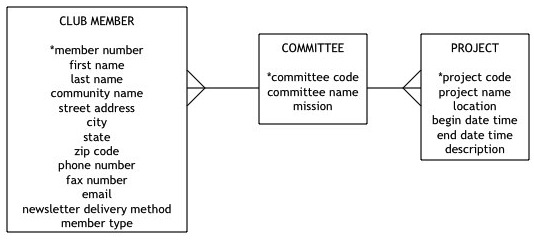
A continuation of the case from chapter 3.
The club has asked you to extend the initial database to include some more detail.
The club has asked you to extend the initial database to include some more detail. There are seven committees, each of which undertakes between three and seven events per year. All club members must join one, and only one, committee. Each committee has a name and specific mission and works on several projects during the year. These projects are given names, take place in specific locations, and have a begin date and time as well as an end date and time. There is also a short description for each event, which is run by one, and only one, committee.
Create the data model and write the following queries.

CREATE TABLE club_member (
member_number CHAR(5) NOT NULL,
first_name VARCHAR(12),
last_name VARCHAR(12),
community_name VARCHAR(12),
street_address VARCHAR(50),
city VARCHAR(12),
state CHAR(2),
zip_code CHAR(5),
phone_number VARCHAR(12),
fax_number VARCHAR(12),
email_address VARCHAR(25),
newsletter_delivery_method VARCHAR(10),
member_type VARCHAR(12),
committee_code CHAR(5) NOT NULL,
PRIMARY KEY (member_number)
CONSTRAINT fkcomname FOREIGN KEY(committee_code)
REFERENCES committee ON DELETE RESTRICT);
CREATE TABLE committee (
committee_code CHAR(5)
committee_name VARCHAR(20) NOT NULL,
mission VARCHAR(60),
PRIMARY KEY (committee_name));
CREATE TABLE project (
project_name VARCHAR(20) NOT NULL,
location VARCHAR(20),
begin_date_time DATE/TIME,
end_date_time DATE/TIME,
description CHAR(100),
committee_code CHAR(5) NOT NULL,
PRIMARY KEY (project_name),
CONSTRAINT fkcommittename FOREIGN KEY(committee_code)
REFERENCES committee ON DELETE RESTRICT);
SELECT committee_name, COUNT (project_code)
FROM project, committee
WHERE project.committee_code = committee.committee_code
AND begin_date_time BETWEEN ’2001-01-01’ AND ’2001-12-31’
GROUP BY committee_name;
SELECT committee_name, last_name, first_name, phone_number
FROM club_member, committee
WHERE club_member.committee_code = committee.committee_code
ORDER BY committee_name, last_name;
SELECT committee_name, COUNT (member_number)
FROM club_member, committee
WHERE club_member.committee_code = committee.committee_code
GROUP BY committee_name
HAVING COUNT (member_number) < 10
ORDER BY COUNT (member_number) DESCENDING;
SELECT mission FROM committee
WHERE committee_code IN
(SELECT committee_code FROM project
WHERE MONTH(begin_date_time) = MONTH(sysdate)
GROUP BY committee_code
HAVING COUNT(project_code) > 0);
To make this a more general SQL query you may want to give the students a month (like June) and have them use the like command.
SELECT UNIQUE committee_name
FROM project, committee
WHERE project.committee_code= committee.committee_code
AND location = 'JRs Park';
| This page is part of the promotional and support
material for Data Management (open edition) by Richard T. Watson For questions and comments please contact the author |